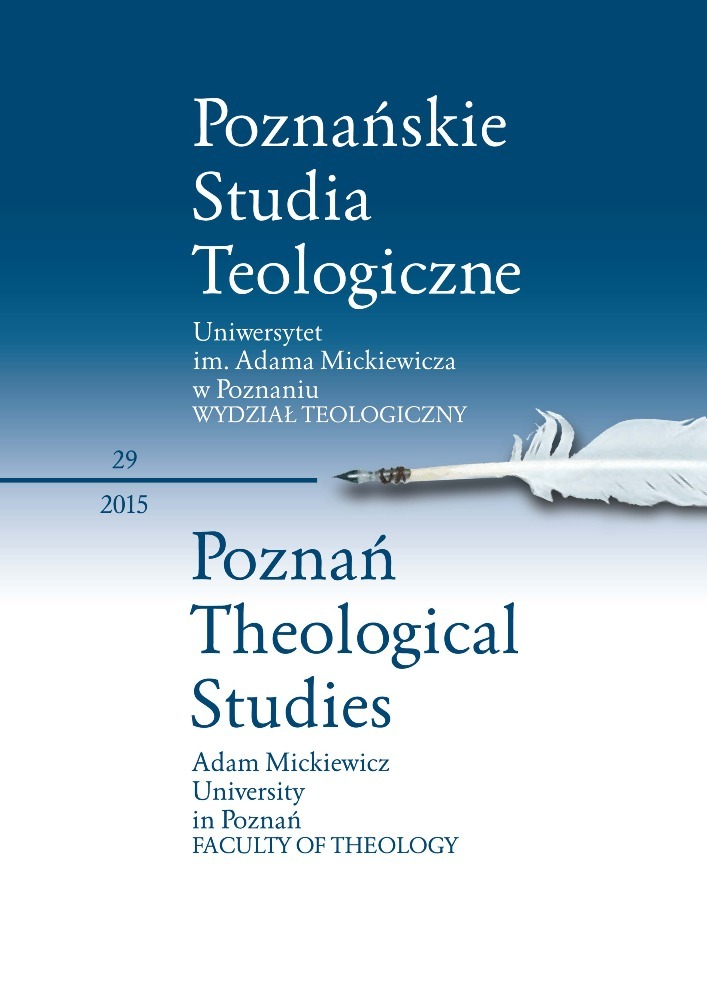Abstrakt
Artykuł Josepha Ellula analizuje podobieństwa i różnice w filozoficznej refleksji Ibn Rusda i Tomasza z Akwinu. Według muzułmańskiego filozofa, o ile religia odnosiła się ludzi poprzez za- stosowane symbole, obrazy i prawa, o tyle filozofia ukazywała prawdę objawioną dzięki dowodze- niu. Dlatego usiłował on zachować harmonię między filozofią i religią, podkreślając zgodność re- ligii z wymogami racjonalnego dyskursu, co szczególnie uwidoczniło się w jego dyskusji nad wy- razową i alegoryczną interpretacją Koranu.
Dla Tomasza z Akwinu prawda objawiona znajduje się poza rozumem, który nie może być do niej w opozycji. Wysiłek intelektualny pełni tutaj charakter służebny: mając na celu wyjaśnianie, potwierdzanie i obronę prawd wiary chrześcijańskiej. W związku z tym dowody powinny być sto- sowane w celu wykazania, że to, co przeciwnicy twierdzą na temat wiary chrześcijańskiej, jest fał- szywe. Mimo że sfera rozumu nie pokrywa się z domeną wiary, to w żaden sposób nie implikuje wzajemnego wykluczenia. Jak zauważa Akwinata, filozof rozważa stworzenia same w sobie, nato- miast wierzący postrzega je w ich odniesieniu do Boga.
Refleksja Tomasza z Akwinu, ubogacona lekturą dzieł muzułmańskiego filozofa, umożliwiła mu spotkanie z reprezentantami religii niechrześcijańskich we wspólnym dążeniu do prawdy. Jego dzieła są świadectwem spotkania filozofii chrześcijańskiej oraz islamskiej inspirowanych zarówno przez perypatetyków i neoplatoników, jak i pośrednio przez muzułmańską myśl teologiczną.
Bibliografia
Alami Dawoud Sudqi El and Hinchcliffe Doreen, Islamic Marriage and Divorce Laws of the Arab World. London-The Hague-Boston: Kluwer Law International, 1996.
Alfarabi: Philosophy of Plato and Aristotle, translated with an introduction by Muhsin Mahdi (revised edition), Ithaca, New York: Cornell University Press, 2001.
Al-Ġazālī, Deliverance from Error and Mystical Union with the Almighty: Al-Munqidh min al-Ḍalāl, English translation with introduction by Muḥammad Abūlayah, and Critical Arabic text established with Nurshīf Abdul-Raḥīm Rifʿat, Introduction and notes by George F. McLean, Washington, D.C.: The Council for Research in Values and Philosophy, 2001.
Al-Ġazālī, The Incoherence of the Philosophers, A parallel English-Arabic text translated, introduced, and annotated by Michael E. Marmura, Provo, Utah: Brigham Young University Press, 2002.
Averroës, The Decisive Treatise determining the Connection between the Law and Wisdom & Epistle Dedicatory, Translation , with introduction and notes by Charles E Butterworth, Provo, Utah: Brigham Young University Press, 2008.
Avicenna: The Metaphysics of “The Healing”, translated, introduced, and annotated by Michael E. Marmura, Provo, Utah: Brigham Young University Press, 2005.
Burrell D.B. C.S.C, Thomas Aquinas and Islam, in J. Fodor and F. Christian Bauerschmidt (eds.), Aquinas in Dialogue: Thomas for the Twenty-First Century, Malden, Minnesota: Blackwell Publishing, 2004, pp. 67-85.
Burrell D.B., C.S.C., “Aquinas and Islamic and Jewish Thinkers” in N. Kretzmann and E. Stump (eds.), The Cambridge Companion to Thomas Aquinas, Cambridge, UK: Cambridge University Press, 1993, pp. 60-83.
Chenu M-D, Aquinas and His Role in Theology, Collegeville, Minnesota: Michael Glazier, 2002.
Craig E., (Editor), Encyclopedia of Philosophy, London: Routledge, 1998.
Dante Alighieri, The Divine Comedy, The Inferno, the Purgatorio and the Paradiso, translated by J. Ciardi, New American Library, New York 2003.
Gardet L., “Saint Thomas et ses prédecesseurs arabes,” in A. Maurer (ed.), St. Thomas Aquinas 1274-1974, Commemorative studies, Toronto: Pontifical Institute of Mediaeval Studies, 1974, vol. I, pp. 419-448.
Gilson É., Les sources gréco-arabes de l’augustinisme avicennisant, (Paris: Librairie Philosophique J. Vrin, 1986).
Habermas J., Ratzinger J., The Dialectics of Secularization: On Reason and Religion, (San Francisco, Ignatius Press 2007).
John Paul II, Fides et Ratio, Vatican City: Libreria Editrice Vaticana, 1998.
Kraemer J.L., Humanism in the Renaissance of Islam (Leiden: E.J. Brill, 1992).
Leaman O., Averroes and his philosophy (Richmond, Surrey: Curzon Press, 1998).
Libera A. de, Averroès: L’islam et la raison, traduction par M. Geoffroy, presentation par A. de Libera, Paris: GF Flammarion, 2000.
Plato: Complete Works, Edited, with Introduction and Notes, by John M. Cooper, Indianapolis/Cambridge, Massachusetts, Hackett Publishing Company, 1997.
Ṭabarī, Ğāmiʿ al-bayān ʿan taʾwīl ây al-Qurʾân, Maḥmūd Muḥammad Šakīr and Aḥmad Muḥammad Šakīr (eds), Cairo: Dār al-Maʿārif, 1374/1954-.
Taylor R.C., ‘Averroes: religious dialectic and Aristotelian philosophical thought’, Peter Adamson & Richard C. Taylor R.C., The Cambridge Companion to Arabic Philosophy (Cambridge, UK: Cambridge University Press, 2005).
Thomas Aquinas, De rationibus fidei contra Saracenos, Graecos et Armenos ad Cantorem Antiochenum, translated by J. Kenny, O.P. as “Reasons for the Faith against Muslim Objections,” in Islamochristiana 22 (1996), pp. 31-52.
Thomas Aquinas, Scriptum super libros Sententiarum magistri Petri Lombardi episcopi Parisiensis, t. 2, ed. P. Mandonnet, P. Lethielleux, Parisiis 1929.
Thomas Aquinas, Summa contra Gentiles, Book One: God, translated with an Introduction and Notes by A.C. Pegis, F.R.S.C., Notre Dame, Indiana: University of Notre Dame Press, 1975.
Thomas Aquinas, Summa Theologiae, English translation published by Blackfriars in conjunction with Eyre & Spottiswoode, London and McGraw-Hill, New York, 1964-1966.
Thomas d’Aquin, Saint: Les raisons de la foi, Les Articles de la foi, et Les sacrements de l’Église, Introduction, Traduction du latin et annotation par Gilles Emery (Paris: Les Éditions du Cerf, 1999).
Tocco de G., Vita Sancti Thomae Aquinatis, , in Fontes Vitae S. Thomae Aquinatis (notis historicis et criticis illustrati), curis et labore D. Prümmer O.P., Fasciculus II, Tolosa s.d.
Waltz J., “Muhammad and the Muslims in St. Thomas Aquinas,” in The Muslim World, n. 66 (1976), pp. 90-91
Weisheipl J.A., Friar Thomas of Aquino: His Life, Thought and Works, Washington, DC: Catholic University of America Press, 1983.
Zerafa P., O.P., “Alterità Mitologika u Alterità Filosofika,” in KNISJA 2000, n. 21 (1992), pp. 14-15.
Licencja
Copyright
© 2015 Uniwersytet im. Adama Mickiewicza w Poznaniu, Wydawnictwo Naukowe UAM, Poznań
OPEN ACCESS
